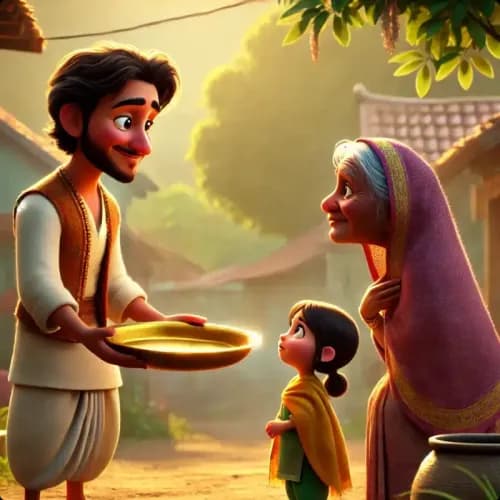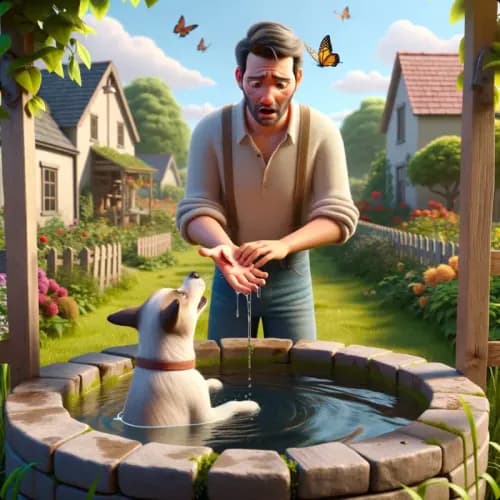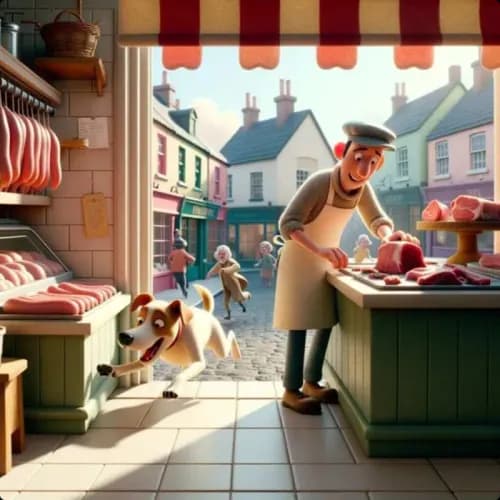Traditional | India
The Merchant of Seri
An honest merchant gains wealth by fairly buying a valuable plate, while a greedy merchant loses out due to his deceit.

Once upon a time, there were two merchants who lived in the town of Seri. Both of them sold brass and tin wares and traveled from place to place to sell their goods. One of the merchants was kind and honest. He always gave people fair prices and treated them well. The other merchant was greedy. He wanted to get everything for free or pay as little as possible when he bought something.
One day, the two merchants went to a town to sell their goods. They agreed to divide the streets between them so they wouldn’t disturb each other’s work. They also agreed that later, they could visit streets the other had already covered. Both of them walked through their chosen streets, shouting, “Buy tin wares! Buy brass wares!” People came out of their homes to see what the merchants had to sell.
In this town, there lived a poor old woman and her little granddaughter. They had once been rich, but now they had nothing left except for an old golden plate. The grandmother didn’t know it was made of gold. She kept it because her husband had once eaten from it, and it reminded her of him. The plate was kept on a shelf with some other old things they didn’t use.
The greedy merchant passed by their house, shouting, “Buy tin wares! Buy brass wares!” The granddaughter heard him and said, “Grandmother, please buy something for me.” The grandmother sighed and said, “We are too poor to buy anything. I don’t even have anything to trade.” The little girl thought for a moment and said, “We have that old plate. Let’s see if he will give us something for it. We don’t use it anyway.”
The grandmother agreed and called the merchant to their door. She showed him the plate and asked, “Sir, will you take this plate and give something to my granddaughter in return?” The greedy merchant looked at the plate carefully. He scratched the back with a needle and saw that it was made of gold. He quickly decided to trick them. He said, “This plate is worth nothing—not even a penny!” Then, he threw the plate on the ground and walked away, thinking he would come back later to take it for almost nothing since the grandmother didn’t know its true value.
Later that day, the honest merchant came to the same street, as they had agreed earlier. He walked past the house, shouting, “Buy tin wares! Buy brass wares!” The little girl heard him and said, “Grandmother, let’s ask this merchant. Maybe he will give us something for the plate.”
The grandmother hesitated. She said, “But, my child, the first merchant said the plate was worthless and threw it on the ground. I don’t think this one will be any different.” The granddaughter replied, “That man was mean. This merchant looks kind. Let’s try.” The grandmother agreed, and they called the merchant over.
When the honest merchant saw the plate, he immediately realized it was made of gold. He said, “This plate is very valuable, much more than anything I have with me. I cannot afford to pay you what it’s worth.” The grandmother was surprised and told him what the first merchant had said about the plate. The honest merchant shook his head and said, “That man lied to you. This is a golden plate.”
The honest merchant gave the grandmother all the goods and money he had, keeping only enough for his travel expenses. He asked her for eight pennies so he could pay the boatman to cross the river. The grandmother gladly gave him the pennies, and the honest merchant left.
A short while later, the greedy merchant returned to the old woman's house. He called out, “Give me the plate! I will trade something for it this time.” The grandmother came to the door and said, “It’s too late. We traded it already with another merchant. You said it was worthless, but he told us it was a golden plate and gave us many things for it.”
The greedy merchant was furious. He cried, “I lost a fortune because of that man!” He ran to the riverside, hoping to catch the honest merchant. But by the time he arrived, the honest merchant had already paid the boatman and was sailing across the river. The greedy merchant shouted, “Boatman, stop the boat!” But the boatman didn’t stop.
The honest merchant reached the city and sold the golden plate for a large amount of money. He lived a happy and comfortable life. The grandmother and her granddaughter also enjoyed a better life with the goods and money they received. As for the greedy merchant, he was left with nothing but his anger and regret.



















